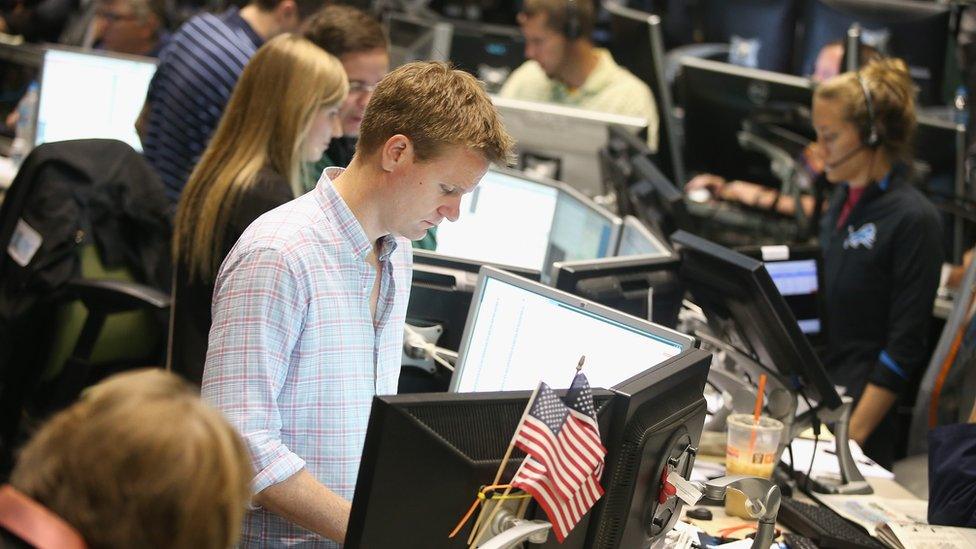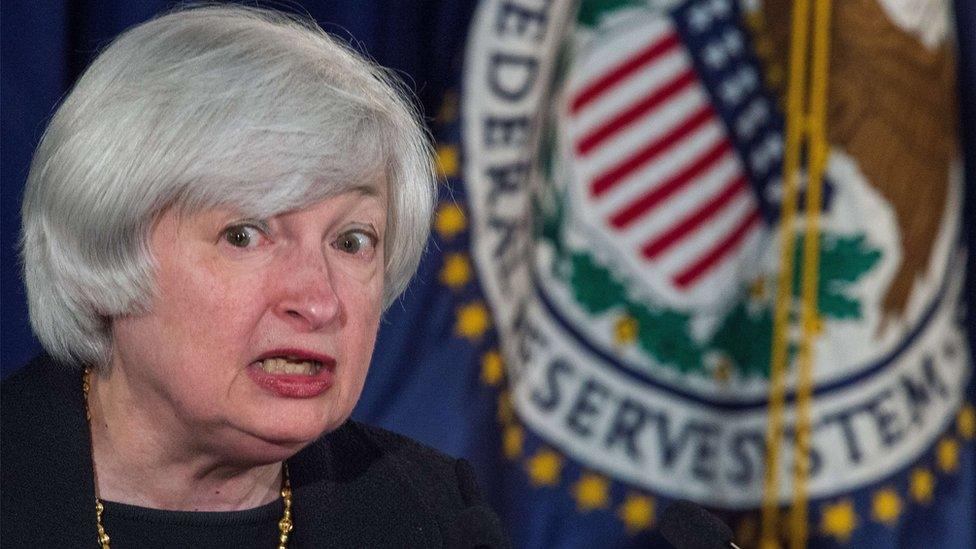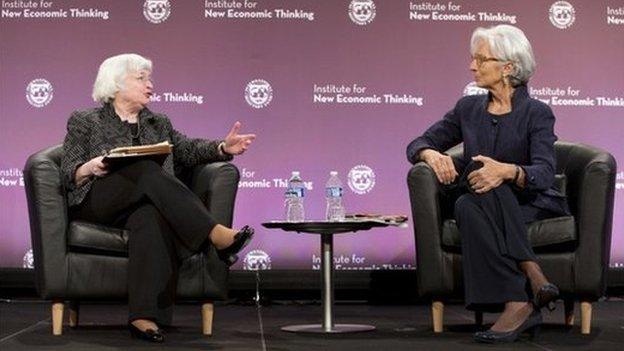What's the problem in the corporate bond market?
- Published

Some savers looking for alternatives to bank deposits have switched to the bond market
The past few months have seen a number of market watchers express concern about the corporate bond market.
This is a $10tn market in which companies sell debt to investors for set terms averaging about eight years.
The market has doubled in size in the past decade, swelled by cheap money after years of low interest rates.
At the same time, banks - the market-makers for these assets, or traditional shop front - have cut their holdings.
The Bank of England estimates, external there has been a 75% reduction in the bond inventories of dealers in the marketplace since 2008.
This means that buying or selling bonds could become harder, which could in turn lead to larger pricing swings.
Why does this matter?
'Very expensive'
As the market has grown, credit mutual funds have tripled in size since the 2008 financial crisis. And as savers have searched for better returns, many have put their money into these funds rather than accept the fractions of percent of interest available from traditional bank accounts.
Looming on the horizon is a potential interest rate increase in the UK - one in the US is likely to be sooner - and this normally spells bad news for bond prices.
So why is liquidity the big issue?
Regulations and capital requirements mean it is now "very expensive to carry inventories" for corporate debt, says Soren Willemann, head of European credit strategy at Barclays. Inventories have been in a slow decline since 2009, he adds.
What makes corporate bonds a different market from shares is while a company may have one share-denoting ownership, it could issue dozens of types of bond, meaning keeping an inventory of bonds is harder.

Jim Leaviss, head of retail fixed interest at M&G Investments, overseeing about £50bn of investments, says the drop in inventory is due to stricter bank regulations.
"For US investment banks in particular, regulation has meant that more capital is needed to own an inventory of bonds. The regulation is to make investment banks smaller," he says. There are similar effects on banks globally as part of an effort by policymakers to make banks safer.
For Citi's credit strategist Matt King, all this is part of a broader picture.
"There are several complicated and interlocking issues," he says. Low interest rates have "herded investors" into making investment that they may not have made otherwise, Mr King says, because investors are searching for high returns - and there are few to find.
More companies have issued bonds, accommodating that new cash. But rather than spend it on new jobs and growth, a lot of the companies' money has funded share buybacks.
'Efficient' dealers
If investors leave this market with their money - for instance as central banks raise interest rates - Mr King says "no-one knows precisely how this will work".
"There is concern about bank regulation putting dealers under pressure. Most of the evidence shows dealers have become more efficient.
"There's always this nagging doubt" that the money may leave as quickly as it arrived, say as savers who shunned cash ISAs pile money into bond funds and then leave when rates rise.
He advises mutual funds to keep cash available should savers want to withdraw money.

Aberdeen Asset Management chief executive Martin Gilbert says central banks should consider action in a corporate bond market collapse
With mutual funds now holding such a large amount of corporate borrowing, "it begs the question: who is the dealer of last resort?" if funds are left holding long-dated bonds and should their clients withdraw money, Mr King asks.
It's a big question. On Monday, Aberdeen Asset Management chief executive Martin Gilbert called for central banks, external to consider stepping in should the corporate bond market collapse, thus performing a similar role to its lender of last resort for banks.
The funds aren't at risk of default because they aren't themselves borrowing, so they can hold long-dated bonds if their clients leave, but they may have to sell to pay them off, Mr King says. And selling in an illiquid market can lead to parting with bonds cheaply and depressing prices.
Harder maths
"Different central banks take different views" on whether to step in, Mr King says.
"Nobody knows how this would work", he adds, because of the difficulty in pricing bonds objectively in a crisis.
When central banks back a bank, they can use economic assumptions to work out the value of their mortgage book, for example. With corporate bonds - issued by companies which can default - the maths becomes harder.
Chris Higham, lead manager of Aviva's £2.7bn Corporate and Strategic Bond Funds, says that to an extent, central banks have already stepped into the corporate market, with the European Central Bank adding a limited amount of corporate bonds in the summer to its own QE bond-buying programme.
More could be added, which would help hold up valuations.

The Federal Reserve, chaired by Janet Yellen, could raise rates in December
Fund managers, for their part, are fighting back.
Corporate bond fund managers have to decide if they buy a bond they may now have to keep hold of it until maturity, says M&G's Mr Leaviss. Keeping more cash, government bonds and using derivatives is helping, he says.
"Sudden regressive rate rises around the world" could be a worry "but the first mitigant against that is the Fed and others have spent the last two years warning people in advance, this will happen slowly," he says.
If the worst comes to the worst, fund managers are permitted to suspend dealing, rather than sell their holdings for a pittance to the detriment of their clients, Mr Leaviss adds.
Michael Matthews, who helps manage the £5bn Invesco Perpetual Corporate Bond Fund, said his firm is holding more cash, government bonds and bonds that are just about to mature.
Doing this "could prove to be as much an opportunity as a risk. In other words, those investors with cash, at a time when others are being forced to sell bonds, may be able to drive attractive bargains", he says.
'Rush for the exit'
Mr Matthews points to two crises - the financial crisis of 2008 and the euro crisis of 2011 - where "in both of those examples investors did not radically alter the pattern of their behaviour. In other words, we did not see large-scale redemptions".
Mr King says this logic should be turned on its head to best understand the problem at hand. Some of these bouts of volatility are concerning, but they are not the problem in and of themselves.
"We've had all these wobbles without any real reasons for anybody to rush for the exit, so the potential for volatility if there is a real reason to rush for the exit is much, much greater," he says.
- Published7 May 2015

- Published6 May 2015
